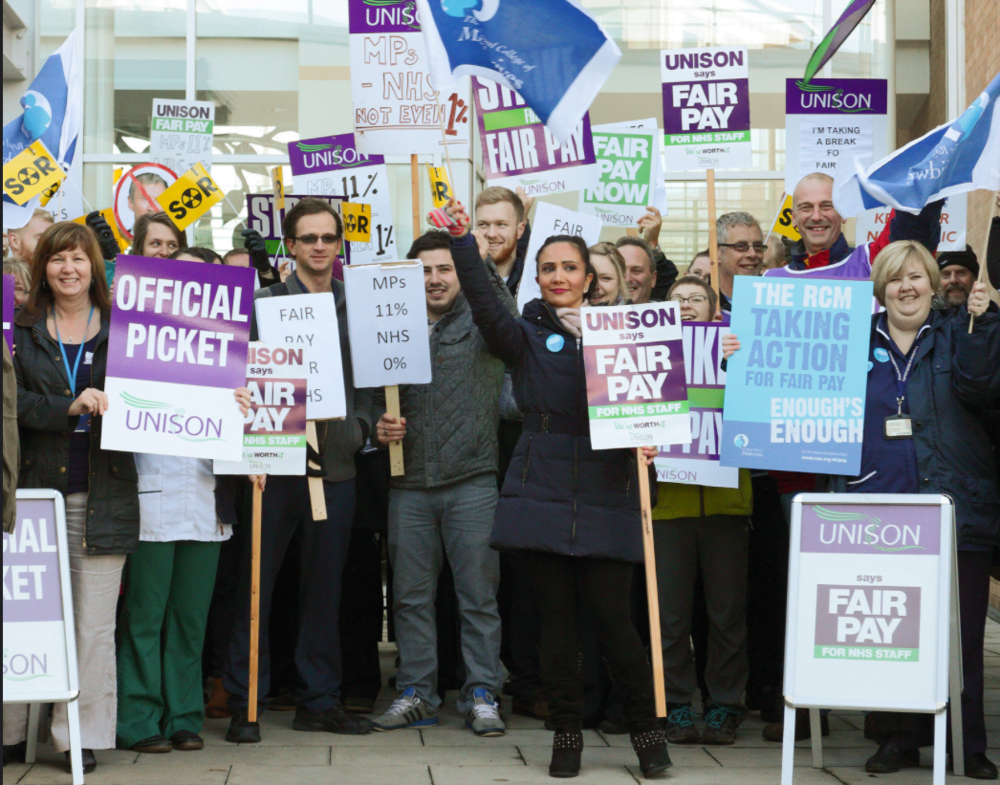The simple answer is yes, Britain can afford a significant pay rise for all five million public sector workers. This would be no more than a modest, inflation-proofing rise – and yet the Conservative Prime Minister roundly rejected the call, and instead laughably raised the spectre of a Greek-style economic collapse!
The Institute for Fiscal Studies estimates that every 1% increase in public sector pay would cost between £1.5 billion and £2 billion a year.
If all five million public sector workers were granted a pay rise of 3%, the EXTRA cost to the Treasury – over and above the government’s already-promised 1% – would be just over £3 billion a year. This is not a generous pay rise. It would enable public sector workers to just keep up with inflation. In other words, it would prevent inflation eating into the real value of their pay rise. It would not compensate for years of cuts in real wages.
£3 billion is less than one quarter of 1% of total British Gross Domestic Product.
In other words, giving five million workers a pay rise would cost less than 1/4 of 1% of the nation’s annual income. Annual GDP was £1.998 trillion in 2016/17. One per cent of GDP is therefore approx £20 billion. (For more on nominal GDP see public finances databank on the Office of Budget Responsibility’s website. Open the excel file, and search last two columns in ‘aggregates’ tab.)
If public sector workers were to spend all £3 billion in the economy (and of course many will save some of the pay rise) – many more millions of workers, shopkeepers and firms in the private sector would benefit too. By spending in these sectors, workers would ‘multiply’ the tax revenues that accrue to government – from VAT paid for purchases and services, to the corporation taxes paid by shopkeepers and firms – as a result of profits made from this additional spending by public sector workers.
If we include workers’ own income tax and national insurance payments into this mix of tax revenues for Her Majesty’s Treasury, almost 40% of the £3 billion spent on a 3% pay increase for 5 million workers would return to the government in the form of tax revenues.
Those revenues would help pay for government borrowing. They would help reduce both the deficit, and public debt as a whole.
Its not rocket science.






6 Responses
Rocket science is easy.. It is rocket engineering that is hard… Same applies to finance it seems… Put more financial engineers the Treasury.
Brian Collins professor of engineering policy.. UCL
OK, I admit you’ve lost me. How can government borrowing £3 billion to fund pay public sector and then getting back 40% of that (£1 200 000 000) ‘help reduce both the deficit, and public debt as a whole’? Looks to me like public debt still rises by 3 000 000 000 – 1 200 000 000 (i.e. £1 800 000 000). Reductions in welfare bill due to private sector expansion?
So that 1.8tn represents additional wages/profits/spending (i.e. economic growth) which are themselves taxed, returning another 40% to the exchequer, and so it continues.
But more fundamentally, even if the government injects extra demand into the economy by spending which is not covered by increased tax take, why is that a bad thing in current circumstances? The increase in demand might encourage corporations to invest some of the 500bn cash pile they’re sitting on into increasing productivity., to meet that increased demand.
Government deficit spending is only a problem if there is no capacity in the economy to expand to meet extra demand created. In that case it would lead to inflation, but that’s not where we are.
Government debt, for a government with the power to issue new money, is essentially meaningless. The Government remains in debt because it wants to, because of various macroeconomic considerations. It is never paid off, it is rolled over at the same time as reducing as a proportion of GDP due to economic growth. History confirms this.
Would you rather have a thriving and fairer economy with higher government debt, or a moribund economy leading to increased inequality because of the obsession with deficits and debt, as we have at the moment?
The former, definitely. I am strongly in favour of deficit spending and totally get that austerity is self-defeating. I was querying the numbers, is all. The article says 40%.
It’s cumulative. Businesses where these 5 million public sector workers spend their money would make more profit, which means they’d pay more corporation tax. But it’s the ripple effect of spenders in society where you really gain. These businesses now need to employ more people – who in turn spend money on other businesses which then, themselves, have to employ more people. Virtuous circle.
Small economic stimuli create waves that benefit all.
I totally agree. In principle I can see that gov’t gets back every £ it spends since it’s then spent again and again and taxed each time until it’s taxed out of existence. Only money that is saved forever escapes, and that will still be on the balance sheet on doomsday, leaving its owner feeling pretty stupid. Article says 40%, though.